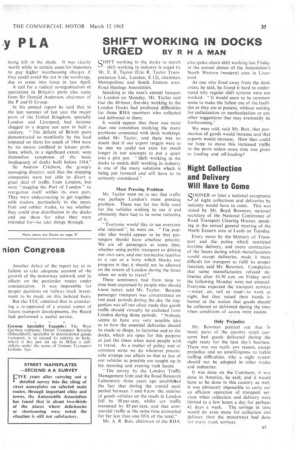SHIFT WORKING IN DOCKS
Page 37

If you've noticed an error in this article please click here to report it so we can fix it.
URGED BY R H A MAN SHIFI' working in the docks to match shift working in industry is urged by Mr. E. R. Taylor (Eric R. Taylor Transportation Ltd., London, E 12), chairman. Metropolitan and South Eastern area. Road Haulage Association.
Speaking at the area's annual banquet in London on Monday, Mr. Taylor said that the 40-hour, five-day working in the London Docks had produced difficulties for those RHA members who collected and delivered to them.
It would appear that there was more than one committee studying the many problems connected with dock workings. added Mr. Taylor, and there was no doubt that if our export targets were to be met we could not exist for much longer in our attempts to put a quart into a pint pot. "Shift working in the docks to match shift working in industry is one of the many solutions which is being put forward and will have to be seriously considered."
Most Pressing Problem Mr. Taylor went on to say that traffic was perhaps London's most pressing problem. There was far too little road for the vehicles wishing to use it and obviously there had to be some rationing of it.
Everyone would like to see everyone else rationed ", he went on. "The popular idea would appear to be that passengers should have absolute priority. We are all passengers at some time, whether using public transport or driving our own cars, and our instinctive reaction to a van or a lorry which blocks our progress is that it should not be allowed on the streets of London during the times when we wish to travel."
These sentiments had from time to time been expressed by people who should know better, said Mr. Taylor. Because passenger transport was concentrated on two peak periods during the day the suggestion was all too often made that goods traffic should virtually be excluded from London during those periods. 'Nobody seems to have any very sensible idea as to how the essential deliveries should be made to shops, to factories and to the docks, which are open for this purpose at just the times when most people wish to travel. As a matter of policy and of common sense we do wherever practicable arrange our affairs so that as few of our vehicles as possible are caught up in the morning and evening rush hours.
The survey by the London Traffic Management Unit and the Road Research Laboratory three years ago established the fact that during the crucial peak period between 5 and 6 p.m. the number of goods vehicles on the roads in London fell by 30 per cent. whilst car traffic increased by 85 per cent, and that commercial traffic at the same time accounted
• for far fess than one fifth of the total." Mr. A. R Butt, chairman of she RHA. also spoke about shift working last Friday at the annual dinner of the Association's North Western (western) area in Liverpool
As one who lived away from the dock areas, he said, he found it hard to understand why regular shift systems were not worked. " It would seem to be common sense to make the fullest use of the facilities as they are at present, without waiting for palletization or mechanization or any other suggestions that may eventually be forthcoming."
We were told, said Mr. Butt, that production of goods would increase and that exports would increase. How then could we hope to move this increased traffic to the ports unless more time was given to loading and off-loading?
Night Collection and Delivery Will Have to Come
SOONER or later a national acceptance of night collections and deliveries by industry would have to come. This was stated by Mr. Boyd Bowman, national secretary of the National Conference of Road Transport Clearing Houses, speaking at the annual general meeting of the North Eastern area at Leeds on Tuesday.
Every move by the Ministry of Transport and the police which restricted daytime delivery, and every contraction of the hours during which manufacturers would accept deliveries, made it more difficult for transport to fulfil its proper function, said Mr. Bowman. Complaints that some manufacturers refused deliveries after 10.30 a.m. on Friday until the following Monday were not unusual. Everyone expected the transport services —water, air, rail or road--to work at night, but they raised their hands in horror at the notion that goods should be collected or delivered during the time when conditions of access were easiest.
Only prejudice
Mr. Bowman pointed out that in many parts of the country retail concerns had goods delivered during the night ready for the next day's business. There was not really any reason, except prejudiceand an unwillingness to tackle staffing difficulties, why a night system should not be. adopted in other trades
and industries. ,
It was done, on the Continent, it was done in .America, he said; and it would have to be -done in this country as well. It was obviously impossible to carry out an efficient operation of transport services when collection and delivery were limited to a few hours a day for perhaps 44 days a week. The savings in time would do even more for collection and delivery than the Motorways had done for many trunk services. .
























































































































